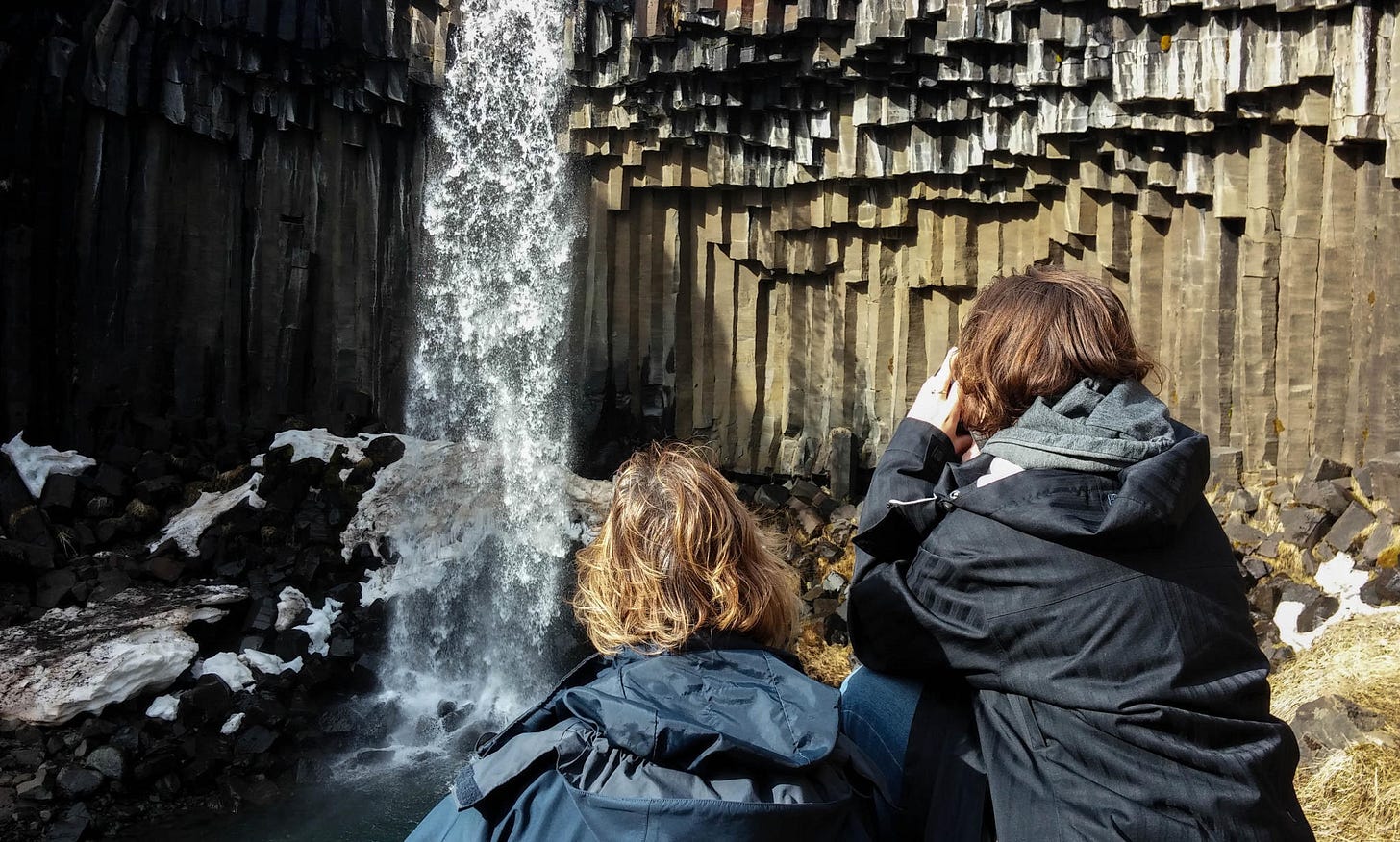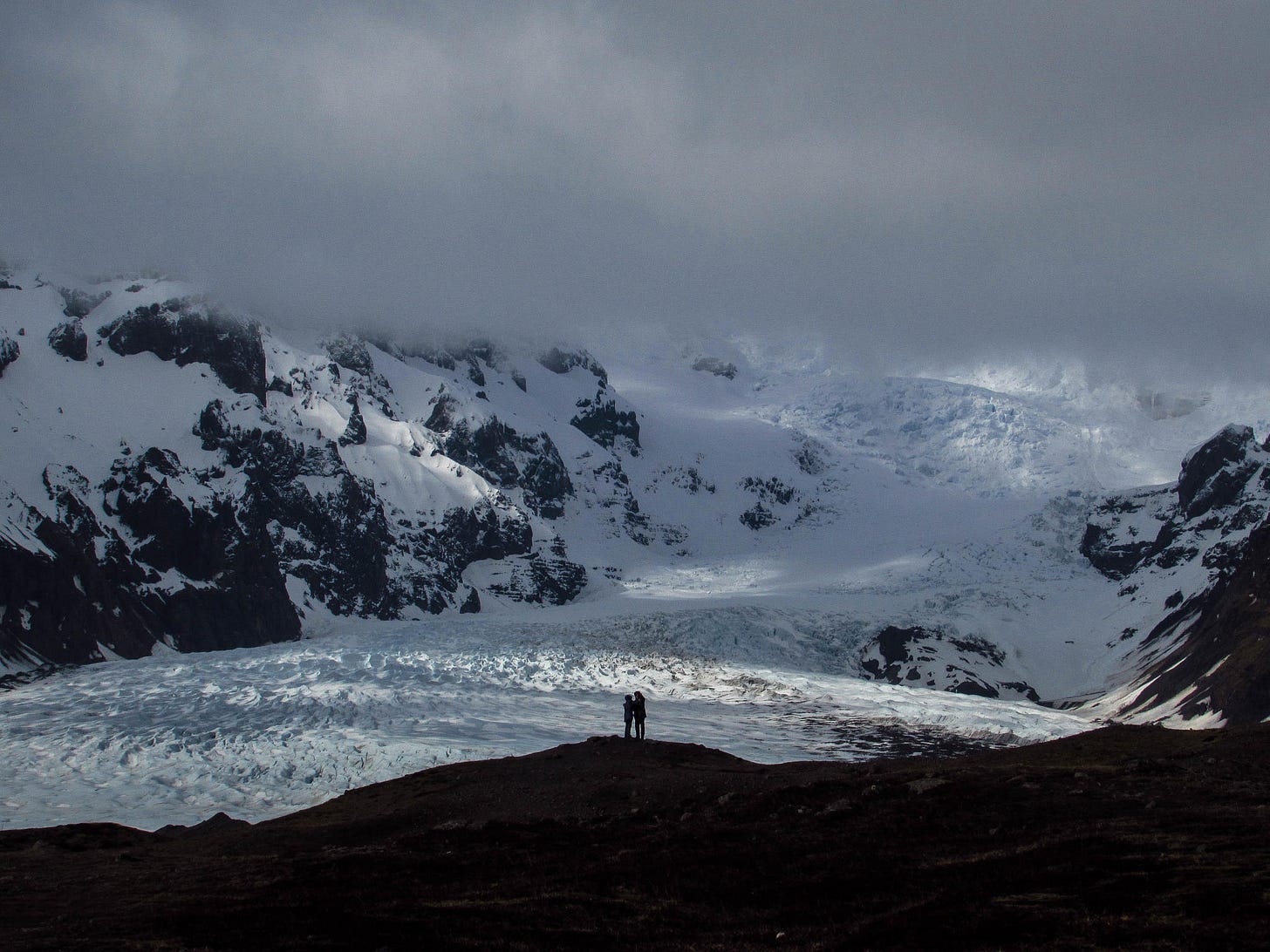Hey friends,
I had big dreams for this week's post but I got some bad news about my mum's deteriorating health yesterday and now it all feels a bit blurgh. There's nothing like late stage Alzheimer’s in a 63-year-old to send you spiralling into questions about the meaning of life.
I tried writing a second post, but it all was a bit negative. And, after staying up late to write it, someone else with almost the same name sent a post out on the same topic - aphantasia - this morning! Even though I know there are tens (hundreds?) of thousands of writers on here, the comparisonitis got to me.
It's funny how we can do all this work on shoring up our foundations but one small (okay fairly big) setback and the cracks start to show.

I've been doing a lot of work on myself these last few years and discovering things like I'm most likely neurodivergent (autistic-ADHD), but my mum, who worked with a lot of kids with ASD in her role as a paediatric OT, taught me to mask so heavily that I'm still unravelling what is me and what is her - aside from the usual parental influence, of course.
It's been a journey. I look back on these last few years of my life and feel overwhelmed by the… Heaviness of it all.
But then I hear the birds and see the light playing on the wall and go outside and sit in the sun (I'm still praying for rain 😂), go for a bike ride, or read a book, put on some music, and remind myself that it's beautiful, too.
This life is beautiful and it’s hard.
Like a diamond, made under pressure. Speaking of, I’m apparently ten years late to the party, but I’ve been reading about underground planetary oceans this week (OK this one’s on a moon, but still) - and how here on Earth there’s thought to be a huge ocean 400 miles underground that contains 3x the volume of water we have here on the surface trapped in bright blue rocks called ringwoodite.
These discoveries may even change our perception of where water - and life - on earth originated. I love that these types of discoveries help us update old facts and theories, and remind us that our minds are plastic and everything is constantly in flux and motion. Even things we thought were set in stone are not.
Psychology is no different. I know it probably feels like there’s this huge “boom” in neurodivergent diagnoses - official or self-diagnosed - at the moment. But it's not a result of more people clamoring onto the bandwagon, as the media seems to believe, but instead is born of a deeper understanding and broadening of knowledge; and a widening of the data net.
For example, the previous data, which was mostly based on young white boys, was only showing a tiny spectrum of the ND experience.
Up until 2012, psychologists didn't believe you could have autism and ADHD, and that autism was rare (approx 3% of the UK population), and much more prevalent in boys than girls at a rate of 10-1. Now, they think it's closer to 30%, 2-1, and that up to 70% of people with ASD also have ADHD. Many women my age are only being diagnosed after their children are diagnosed.
There are entire generations and sections of the human population who have fallen through the net for generations and are only now understanding that they weren't the problem; that this world just wasn't built for them. And the truth is, it wasn't built for a lot of us.
A lot of it wasn't built at all; at least not on purpose. It's built on a butterfly effect - a tiny wing flap on one side of the world affecting the other. A spiraling series of motions that have led us all into an unintentional labyrinth.
As with all things, it’ll probably take science and society a long time to catch up. But the only way through is by being open to change; by embracing our mind's plasticity and saying I used to believe this, but now we know this and that's okay.
We're allowed to change. It's better if we do. Gosh, I would hate to still be the same as I was when I was 18 or 21 or 25. I would hate to be stuck in the same thought patterns I was in even last year.
Our minds also often feel like labyrinths - but they're often of our own making. This means that we're the only ones who can help us escape, and part of that comes from accepting us as humans who make mistakes and grow and having compassion for ourselves through that transition.
This compassion also helps us accept everyone else and the world as malleable and able to change, too. The softer we are, the more difference we can make. The harder our edges; the tougher it is. Like, I don’t know, imagine a jar of marshmallows vs a jar of nails. I bet you can fit in more marshmallows than nails.
Side note: I’m on a hot chocolate comfort kick right now and can’t seem to find wheat and gelatine-free marshmallows anywhere and it’s bugging me, so marshmallows are currently living rent-free in my mind.
It's funny, life these last few years should have turned me into that jar of nails, but instead, I feel like the marshmallows. I feel like I’m softer. Gentler. Like I have more capacity for love and wonder and can better handle the nails that come my way - like the message last night.
And so, while I sit here in my cocoon and kintsugi those little cracks in my soul back together, I just wanted to finish up this post by sharing a few of my current favourite ways of turning these lemons into lemonade.
1: Being in nature. Even if it’s literally just going to stand under a tree or look at a flower, there’s nothing like getting out into nature when things get hard. I’m still mourning the fire that ravaged my local bushland a few weeks ago, but I’m also seeing a lot more birds in the trees around my house.
Nothing like nature to remind you to take the good with the bad.
2: Flipping my perspective. I’ve recently started going on late-night walks around the neighbourhood and honestly, it’s been kind of fun to flip my perspective and see the streets I know so well by daylight in the dark. Obviously, I’m lucky to live in a safe enough place to do this - which definitely hasn’t always been the case - but there are other ways of flipping our perspective, too.
3: Macro photography. If I’m really struggling to get out of my head and all else has failed, taking close-up photos of flowers and leaves or even random things around the house really helps. While I prefer to do this with my macro lens on my camera, phones definitely do the trick too.
4: Journalling. I love journalling because it helps me round off those hard edges and keeps me fluffy and full of love inside. It also feels like it’s my way out of the labyrinth - like I get to explore what happens if I go down this path or that on the pages of my journal before committing to it too far, and seeing if I like what I find or not. 10/10 recommend.
Note: If you’re not sure where to start with journalling or want to try some new techniques, I have a resource below that might help!
5: Automatic writing. If journalling isn’t your favourite way onto the page, automatic writing might help. While some people might say they’re the same, I liken them to trying different doors until you find one that easily opens.
For me, automatic writing is what I do when there’s just too much going on and I can’t still or settle my body or my mind. I light a candle, close my eyes, take a few deep breaths in and out, try to clear my mind of any thoughts, and then meet the blank page.
I might even start with writing or typing “hello”, like I’m really meeting it, and then just see what follows. I like how you never know what’s going to come up. It helps keep things novel and exciting, whereas journalling I can find a little tougher sometimes - like I have expectations I’m trying to meet.

Alright, time to go make a hot chocolate and pretend it’s cold outside.
Thanks for being here for this semi sad brain dump while I help make sense of my changing world. Damn, Alzheimer’s sucks. If you want to read more about my journey with it - or about being a long-distance carer - you can here, here, or on my Instagram page.
For now though, I’ll catch you next week or in the comments.
Love always,
Cassie xx
PS: If you want to learn more about my approach to journaling or automatic writing, I’ve written a little seasonal journalling ebook. I really should upload it to my website and send you the link, but as I’m already hours late sending this out, just hit reply to this email and I’ll send it to you!
Or you can also download it here actually. If you do, please let me know how you get on and if it’s helpful!
PPS: I’m currently in the process of launching a new vertical called Creative Lemonade. It’ll be more focused on how we can use creative practices to make lemonade. If there’s anything you’re interested in seeing there, let me know!
PPPS: As always, please subscribe, like, comment, and, if you think anyone else would like this, please share with your friends. I appreciate you!







Sorry to hear your news Cassie. Thank you for sharing. Some great ideas in here. Xx
I really enjoyed this one. Maybe it was the brain dumpy aspect and the links to tangental things, because that's also how my AuDHD brain works. ❤️